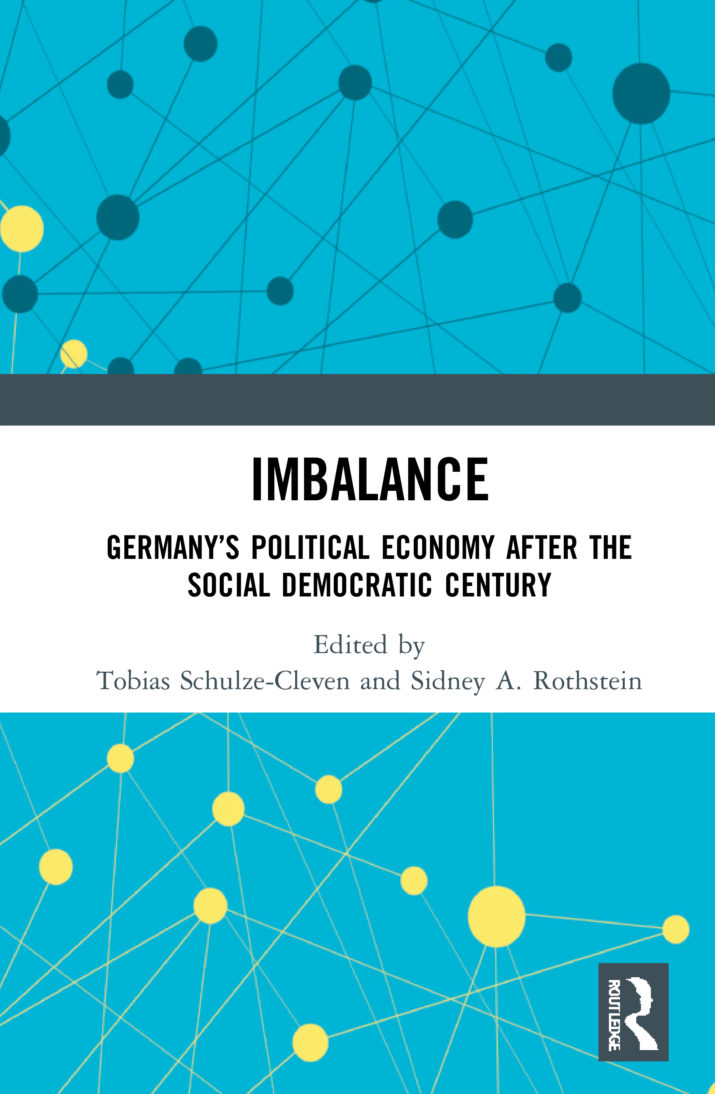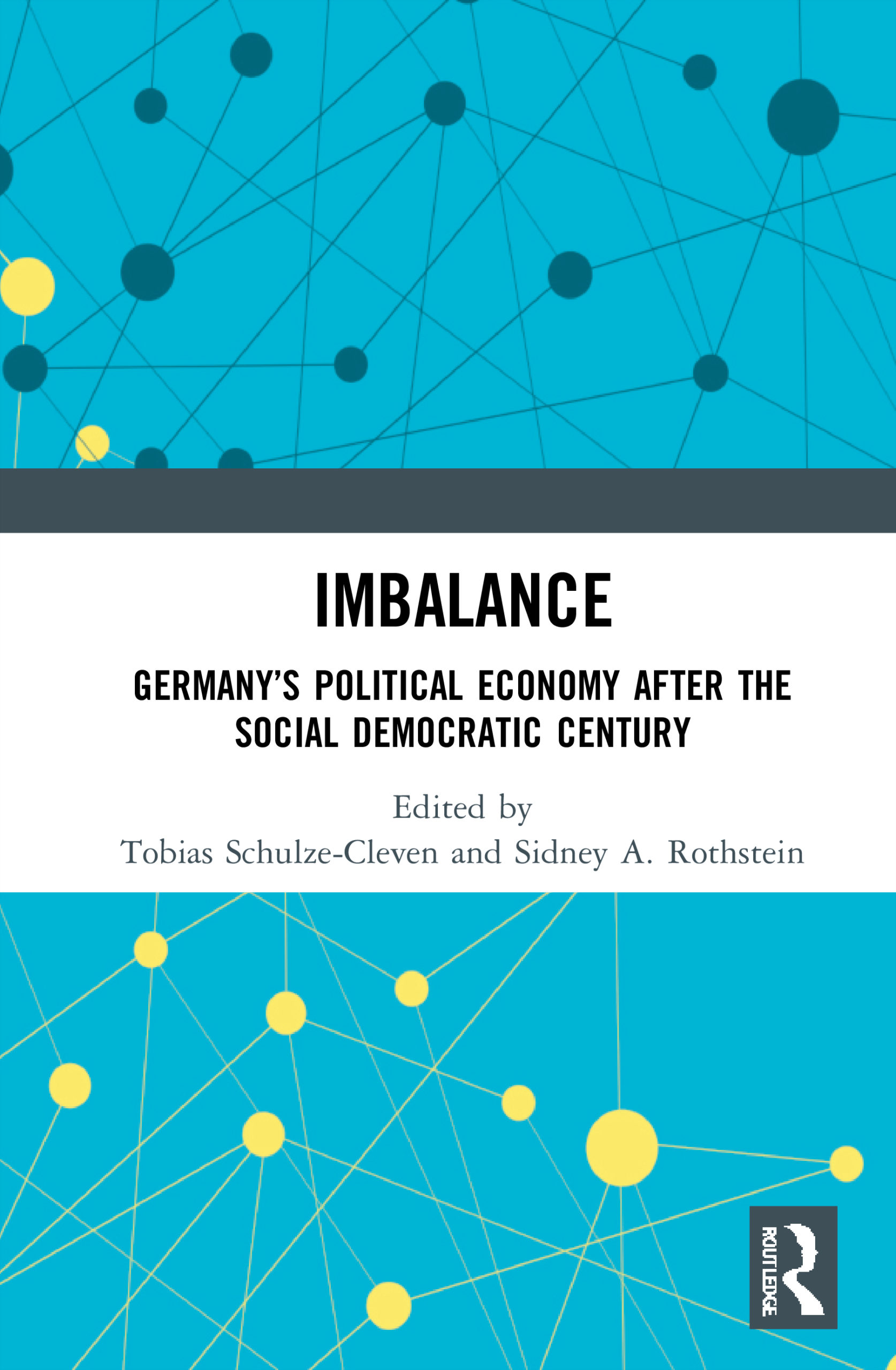
Imbalance: Germany’s Political Economy after the Social Democratic Century by Tobias Schulze-Cleven and Sidney A. Rothstein

The volume Imbalance, edited by Tobias Schulze-Cleven and Sidney A. Rothstein, masterfully presents multiple imbalances of the German political economy and provides analytical insights into where they stem from and what they mean. The impressive collection of papers adds to a large body of research on one of the most central and best studied cases of comparative political economy. However, instead of providing us with more of the same, it attempts to redirect the often-exaggerated notion of institutional stability of the “coordinated market economy” par excellence that is often used to describe Germany. It does so by providing impressive empirical accounts ranging from trade union studies to an analyses of skill formation. Methodically, it includes varying approaches from analyses of balance sheet accounts to constructivist analyses of ideologies molding the German Model. Indeed, it is a strong suit of this volume that several of the chapters combine constructivist and economic approaches and thereby make full use of the repertoire of social science analysis. The editors also propose a theoretical framework, inviting scholars to explore the consequences of the imbalances of the German political economy. While the individual empirical chapters could stand alone, the editors highlight what the numerous imbalances in different arenas amount to when taken together. Moreover, imbalances regarding inequality, trade, capital and labor, society and state, as well as market and democracy are global phenomena. The question posed, then, is not whether Germany’s path is economically (as well as ecologically and politically) sustainable—the answer is clearly no—but what could be done to make it more sustainable.
The book connects with previous work about the necessity of continuous (incremental) adaption and reproduction of a given institutional order even for maintaining the status quo. However, it argues that on several fronts we see much more “work in progress,” change, and what I would call “institutional precarity” than commonly acknowledged by the literature. The different chapters relate the clear signs of overstretching institutions to the growing power imbalances between labor and capital, inequality, and the economic but also ideological dominance of export-led firms. Usually, though, balance in German political economy is theorized based on different conceptions. First, the Varieties of Capitalism-literature (VoC, Hall, and Soskice 2001) commonly assumes balance between long-term corporate and workers’ interests, as well as between corporate strategies and the existing institutional framework. A second conception assumes stability based on interest intermediation between labor and capital (“Konfliktpartnerschaft” Müller-Jentsch 1991). Finally, ideational conceptions emphasize the balance between ordoliberalism and social insurance, and state and society. Against this backdrop, the book’s theoretical framework proposes three vantage points for the study of Germany’s imbalances: “the systemic properties of capitalism, multivalent policy feedback, and the organizational foundations of creative adjustment” (Rothstein & Schulz-Cleven 2021: 9). As shown by the empirical accounts in this volume, capitalist expansion and the exhaustion of social security unbalance the interest coalition between workers and capital. As a result, the power balance between the two has shifted considerably in favor of the latter. This and further instabilities from multiple angles build up to systemic imbalances through multivalent policy feedback. Moreover, the existing institutions and constellations limit room of maneuver and therefore lock in paths towards further imbalances between capital and labor, between domestic and export-led growth, in international trade, and so forth. The absence of power and, consequently, conflict in the classic VoC has been criticized before (e.g., Howell 2003; Kiess 2019). Going beyond this criticism, the merit of this volume is to systematically combine up-to-date theoretical advances and empirical insights from multiple perspectives under one headline.
The elephant in the room when speaking about imbalances is Germany’s reliance and insistence upon a strategy that has been summarized as export-led growth. Several chapters touch this theme from different angles: Benjamin Braun and Richard Deeg investigate the continued weakening of German banks vis-à-vis German firms, showing that exporting companies have been so successful in recent years that they not only contributed to huge trade surpluses, but also to making banks—the traditional lenders for business in the “old” Deutschland AG—dispensable. Brigitte Young makes it very clear that the competitiveness of German firms is neither due to the quality of machinery made in Germany nor to ordoliberal policies, but to a large extent to the Euro-Currency-Regime. In his contribution, Wade Jacoby adds a practical and very critical perspective and explains why German policymakers have to change their stance and arguments on trade imbalances if they want to avoid further transatlantic conflict and international instability. Björn Bremer, too, engages with the programmatic ideas shaping the German political economy by analyzing how the SPD so far was unable or unwilling to leave behind supply side economics after the financial crisis and, thus, lacks a coherent economic program. This, of course, is a millstone around the party’s neck but it also continues to limit any progress in German policymaking.
Imbalance is by no means restricted to a critique of the German growth model. It also provides important insights on trade unions, arguably a decisive factor for the future development of not only the German political economy. Thomas Haipeter discusses the effects of and experiences with increasing cost pressure and emphasizes the agency of trade unions and works councils. Stephen J. Silvia investigates German unions’ attempts to build transnational alliances, and Martin Behrens and Heiner Dribbusch analyze employer’s resistance against works councils. The insights generally support the reading of an increasing power imbalance between capital and labor without overdramatizing it. Moreover, skill formation regimes (chapter by Niccolo Durazzi and Chiara Benassi), inequality in Germany (chapter by Jan Behringer, Nikolaus Kowall, Thomas Theobald and Till van Treeck), and the growing imbalances of the welfare state (chapter by Ute Klammer) are interwoven with the macroeconomic and international imbalances mentioned above. It is here in particular that the inquiry of further topics (workplace democracy, transformation of work through digitalization, etc.) and the bridging of political economy with political sociology could be mentioned as a point of reference for further debates. However, particularly connecting the analyses at hand to political sociology and what they implicate for society—think of the now established right-wing extremist Alternative für Deutschland, decreasing political trust as well as social and political exclusion of some segments of the population particularly in East Germany—clearly goes beyond the scope of this volume.
What makes Germany such an interesting case to study is its important role within the political economy of Europe and the global economic order. Despite the growing geopolitical importance of Asia, Europe is still central to global governance in a context where the G7 and G20, WHO, and UN, are fighting challenges such as climate change, or the COVID-19 pandemic. Responses will need to be developed in Europe, which, as e.g. experience during the Euro crisis teaches, needs to regard Germany in particular as a central economic and political player. At the same time, German policymakers need to learn that the current imbalances in the German political economy will lead to further domestic and global turmoil. With economic power comes social responsibility. Here, the editors’ optimistic account of labor organizations and their political allies might turn out unrealistic: the imbalances of the German political economy are indeed deeply rooted and resonate even within Social Democracy and the trade unions. However, both the editors and the contributors make it clear that, without optimism, the challenging times ahead surely will bring about hard times for citizens abroad and in Germany. In other words, the multiple imbalances of Germany’s political economy will hurt the global economy and continue to contribute to global and national inequality. This book is a great collection of timely and important research and a must read for students of comparative political economy in general, and Germany in particular.
Johannes M. Kiess, PhD, is a postdoc researcher at the University of Siegen were he currently works on political and social trust in Europe. He also serves as the deputy director of the Else-Frenkel-Brunswik-Institute for Democracy Research at the University of Leipzig. In Leipzig, he focuses on right-wing extremism, democratic learning, and strengthening civil society.
Imbalance. Germany’s Political Economy after the Social Democratic Century
By Tobias Schulze-Cleven and Sidney A. Rothstein
Publisher: Routledge
Hardcover / 274 pages / 2021
ISBN: 9780367683542
References
Hall, Peter A. and Soskice, David (2001): Varieties of Capitalism. The Institutional Foundations of Comparative Advantage. Oxford: Oxford University Press.
Howell, Chris (2003): Varieties of Capitalism: And then there was one? Comparative Politics 36(1): 103-124.
Müller-Jentsch, Walther (1991): Konfliktpartnerschaft. Akteure und Institutionen industrieller Beziehungen. München/Mering: Hampp.
Kiess, Johannes (2019): Die soziale Konstruktion der Krise. Der Wandel der deutschen Sozialpartnerschaft aus der Framingperspektive. Weinheim: Beltz Juventa.
Rothstein, Sidney A. and Schulz-Cleven, Tobias (2021): Germany after the Social Democratic century: The Political Economy of Imbalance, in: Rothstein, Sidney A. and Schulz-Cleven, Tobias (eds.): Imbalance. Germany’s Political Economy after the Social Democratic Century, pp. 9-30. London/New York: Routledge.




